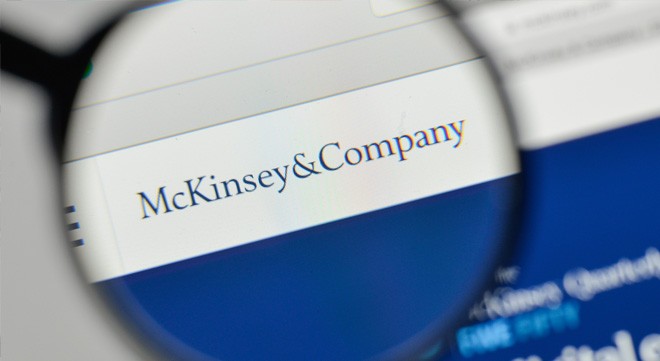The African unit of international consulting firm McKinsey & Company will pay about $123 million to resolve an investigation by the United States Department of Justice (DoJ) into a scheme to pay bribes to Eskom and Transnet officials between 2012 and 2016.
McKinsey Africa entered into a three-year deferred prosecution agreement (DPA) with the department in connection with a criminal information filed in the Southern District of New York charging the company with one count of conspiracy to violate the anti-bribery provisions of the Foreign Corrupt Practices Act (FCPA), the US DoJ said last week.
A former McKinsey senior partner, Vikas Sagar, pleaded guilty in December 2022 to one count conspiracy to violate the FCPA and was alleged to be the scheme’s ringleader. The guilty plea was unsealed and made public on Thursday.
According to court documents and admissions, McKinsey Africa, acting through Sagar, agreed to pay bribes to then-officials at Transnet and Eskom.
Between at least 2012 and 2016, McKinsey Africa obtained sensitive confidential and non-public information from Transnet and Eskom regarding the award of lucrative consulting contracts and submitted proposals for multimillion-dollar consulting engagements, while knowing that South African consulting firms with which McKinsey Africa had partnered would pay a portion of their fees as bribes to officials at Transnet and Eskom. As a result of the bribery scheme, McKinsey and McKinsey Africa earned profits of about $85m, the DoJ said.
McKinsey has made financial restitution to these entities by returning all fees paid to it, with interest.
According to Sagar’s plea agreement, he and others were permitted to draft portions of Transnet and Eskom’s requests for consulting bids and internal documents justifying their non-use of public tenders.
Pursuant to the DPA, McKinsey Africa has agreed to pay a criminal penalty of $122 850 000. The DoJ has agreed to credit up to one-half of the penalty against amounts McKinsey pays to authorities in South Africa in related proceedings.
In addition, both McKinsey and McKinsey Africa have agreed to, among other things, continue co-operating with the Criminal Division’s Fraud Section and the US Attorney’s Office for the Southern District of New York in any ongoing or future criminal investigation arising during the term of the DPA.
McKinsey to pay South Africa R1.1bn
In tandem with the DPA, the National Prosecuting Authority (NPA) announced on Thursday that McKinsey South Africa will pay about R1.1bn into the country’s Criminal Assets Recovery Account, “in recognition of the social and economic harm caused by the conduct of a former employee in South Africa”.
In terms of the corporate alternative dispute resolution, McKinsey will also help the NPA’s Investigating Directorate Against Corruption “by continuing to hand over information and material in its possession”.
In terms of the resolution, McKinsey admits, accepts, and acknowledges responsibility under South African law for Sagar’s criminal actions and conduct.
The resolution also obliges McKinsey to continue investing in its local and international corporate compliance anti-corruption programme to prevent and detect future corrupt practices. The programme is modelled on the US DoJ’s compliance requirements that include adoption of risk-based controls and data analytics, investing more resources in compliance, and foregrounding compliance in internal assessment-based training, messaging, and company policies.
McKinsey is required to appoint a dedicated senior compliance official is required who reports to the board on compliance matters and who holds significant independence. McKinsey fulfilled this obligation by hiring a global chief ethics and compliance officer in 2021. There are also anti-corruption requirements when contracting with third parties, such as supplier development partners. Significant due diligence must be carried out before the conclusion of such deals. Compliance must be monitored and audited on an ongoing basis.
The resolution permits the NPA to re-open its investigation concerning McKinsey if it fails to implement the compliance programme, fails to provide the necessary co-operation with the South African investigations into the relevant conduct, or if it provides materially false, incomplete, or misleading information to the NPA.
The NPA said its Asset Forfeiture Unit (AFU) played a key role in facilitating the finalisation of the resolution.
Ouma Rabaji-Rasethaba, the head of the AFU and the Deputy National Director of Public Prosecutions, said the resolution was “another significant step that takes South Africa forward in fighting crime. The NPA remains committed not only to prosecuting criminals but also to contributing to the economic recovery of the country through restitution. Corporate alternative dispute resolutions address both of these mandates of the NPA in a cost-effective impactful way. Such resolutions are a globally recognised and proven crime-fighting method. This strategy is to be embraced as South Africa recovers from the effects of state capture.”
‘Full resolution’
In a statement on Thursday, McKinsey said it conducted “an extensive investigation” into the corrupt conduct” of Sagar, who concealed his unlawful conduct from the company and his colleagues and then sought to cover up his conduct. McKinsey terminated his employment more than seven years ago.
McKinsey said it has “zero tolerance” for employees who do not strictly adhere to the company’s compliance policies, procedures, and professional standards.
“McKinsey is deeply remorseful that an employee of our firm engaged in corrupt conduct. We publicly apologised in 2018 and chose to take accountable action, including taking responsibility for Sagar’s conduct. Our significant remediation efforts and investment in our risk control functions and processes, extensive investigation, full co-operation with the authorities in the US and South Africa, and full repayment of the fees to the state-owned enterprises years ago led to the full resolution of these matters.”




Yet more attempts to cover up and act oblivious to what they knew was really happening. They make Sagar the fall guy when they probably gave him the mandate to do what he did! Nice to have a scapegoat…. The fines should be much more than that if it is related to what SA have lost as a country…. many billions of dollars!!!!